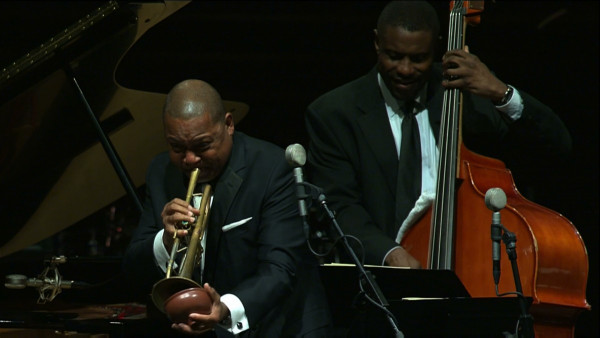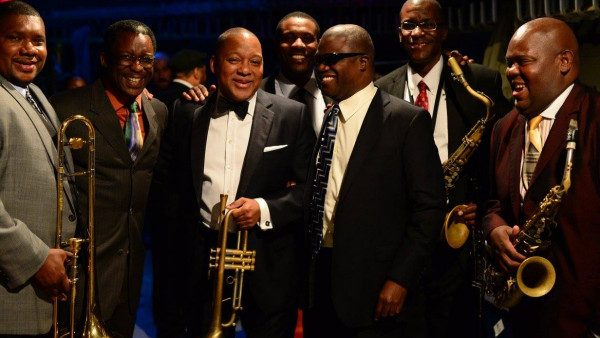Wynton Marsalis’ Acceptance Speech at Marian Anderson Award 2015
I would like to thank the Board of Directors and Chair Nina Tinari for selecting me as recipient of this year’s Marian Anderson Award. Thank you Mayor Nutter. And thanks to young Max Chambers who was accompanied by the great Farid Barron, to Miss Misty Copeland, to Lalah Hathaway, to Kim Burrell, to Bill Jolly and his band, and to my brothers for life, the seven.
We are all perpetually born mid-stream. Where we have been determines where we are and most often indicates where we will probably be going. But only our (personal) choices in each present (passing) moment can truly decide the direction and quality of our future. Though some love to worship the ever-glorious past, we are burdened with a painful history chained to the dark star of slavery. Yes, it is the blood-soaked parts of our nation’s roots that cost us the virginity of our idealism. However, it also provided us with the opportunity to discover what we were willing to sacrifice for the cause of freedom, and it was indeed a great sacrifice for the entire nation.
A sustained and unspeakable hardship is known by the name tragedy and leaves pathology, sickness and death in its wake. It can also produce magnificent and lasting monuments to the human yearning for love, for personhood, and for freedom. Of all that came from slavery, music is the most enduring and powerful gift. It is an inheritance, a legacy. And that music, like the principles that undergird our beliefs, still possesses the power to liberate and enlighten as it also has the power to denigrate and enslave. Back when there were extremely popular minstrel shows with all types of cooning and tomfoolery, there also were spirituals sung on plantations in their natural voice and rhythm, and after slavery, there came to be spirituals sung with European voice and harmony. All three created powerful legacies that still today have the power to liberate, or to enslave. Just as more attention is paid to crime and gossip than to news, there is more attention given to slavery than to freedom. Well, for some, slavery is a more lucrative and sustainable story, while freedom remains as a hard fought thing for all.
The quest for freedom causes acute discomfort and pain. That quest can destroy friendships and families and even…. lives. Freedom is nothing to play with. And Marian Anderson understood that most clearly because it cost her a great deal. Well, all the old folks understood the price of being free (whenever it was even remotely attainable), because it always cost just a little more than you actually had. I always noticed growing up that when you asked really old folks about their dues-paying past, they would mainly say, “Whatever the price was, it was less than my momma and daddy and them paid.”
All of us are born mid-stream, birth-righted into a genetic inheritance, into different economic circumstances and into different ‘times’. For our purposes tonight, I’d like to identify Marian Anderson’s place on the social, political and artistic timeline of our national calendar. In her case, definitive moments in all three of these areas converged in a most powerful and devastating way. And her story is worth our national focus because a large portion of any group’s understating of itself consists of the parts of its past that IT considers to be worthy of amplification into its future. That glorified past is our mythology. It is the ‘story of us’ that we live by and that we study and ultimately teach to our children. And if it has no connection to reality (or if it becomes too idealized), we lose the diversity of experience necessary for functional clarity. We live lies and wither on the vine of unquestioning self-aggrandizement.
Truth be told, the artistic story of Marian Anderson is much more of an American story than even a Black American story. It is the reality of church members who paid for her lessons with the Italian voice instructor Giuseppe Boghetti, as much as it is the investment of Mr. Boghetti who went on to teach her for free upon realizing what God had sent him.
Her social story is as much about winning a competition to sing with the New York Philharmonic in the early 1920s, as it is about the encouragement of Roland Hayes, the greatest American Negro tenor of the period.
Her political story is as much about the Daughters of the American Revolution versus Eleanor Roosevelt as it is about Marian herself. And in each of these stories, Marian Anderson emerges triumphant and even transcendent because: she did not succeed alone. Her victories were plural. They represent OUR triumph over ourselves.
And because the life of Marian Anderson calls us to action, let us realize as we sit here tonight that the Afro-American is still called upon to wear the blackface of degrading names and provide safari experiences for spectators “in the hood”; still called upon to provide comic relief against the backdrop of heinous crimes that were committed against him (though some were no worse than crimes he committed against himself) which were exacerbated by the promises in our nation’s credo of freedom and equality.
Let us realize that as the black American degrades himself or herself for the entertainment of others and for each other, so too does the nation degrade itself in the eyes of the world. Let us realize that as the black American goes uneducated and mis-educated so do multitudes of other American students who are taught to reconcile the actuality of disparity and inequality with vacuous code words like ‘inner city’, ‘underserved’ and ‘at risk’, whose very utterance encourages inaction.
Let us realize that as the black American is incarcerated for years in record numbers, many for the mere perception of crimes or for meaningless infractions, so too does the nation incarcerate itself. And let us realize that deep wisdom and a rejection of all those lies can be found in the sound of our best music. It expresses something deeper than angry words or nihilistic prophecies. In the seething hot cool elegance and learned virtuosity that is the voice of Marian Anderson, there is affirmation, optimism and confidence. A swagger because excellence itself is a form of protest.
And because the life of Eleanor Roosevelt was serious, let us honor her by participating fully in the ongoing evolution of our political process.
And because the New York Philharmonic is serious and the life of Roland Hayes was serious let us honor them by including our kids and families in our nation’s great cultural events.
And because the life of Marian Anderson was serious, let us honor her by giving it the proper framework to resonate in all of its true glory far, far, far into the future.
For the opportunity to add luster to her accomplishments, I am deeply grateful.
Thank you.
Wynton



Comments
The music was moving. The acceptance speech spoke truthfully and clearly to the injustices imposed on minorities. There is no doubt that we will have to answer as a nation, not individual ethnic groups, to the world for the continued atrocities that have become the acceptable social norm. Mr. Marsalis’ speech moved and stirred my spirits to a esoteric level. I truly honor him for his vision as well as his gifted talent.
Patricia Ribinson on Feb 3rd, 2016 at 6:50pm